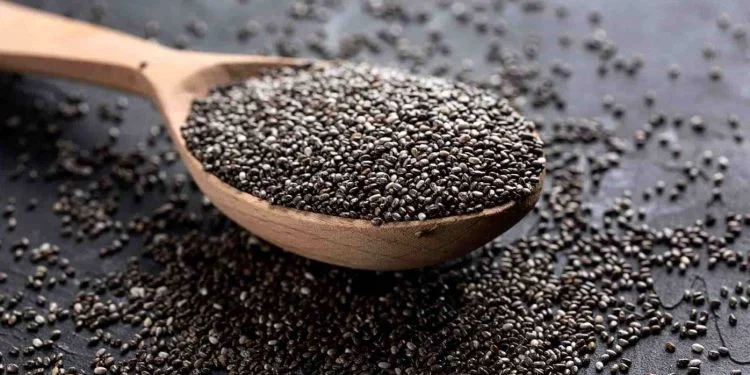Benefits of chia seeds; which have been used since ancient times, support healthy nutrition by providing energy and strength with the high fiber and Omega-3 fatty acids they contain.
Chia seeds provide protection against cancer and inflammatory diseases thanks to their antioxidant properties; It strengthens the body against diabetes, cardiovascular and digestive system diseases, and has an anti-aging effect on skin health. However, it is recommended to use it with caution as excessive consumption may cause stomach and intestinal problems.
It is frequently used in vegan diets due to its high nutritional value.
Chia seed is a flowering plant from the mint family, belonging to the Salvia hispanica family, native to South America, Guatemala and Southern Mexico. It was used as part of traditional medicine by the Aztecs and Mayans. Nowadays, it is a popular functional food. This miraculous food, which contains 42. g carbohydrates, 30.7 g fat and 6.5 g protein in 00 grams, is a good source of herbal Omega-3, especially for vegans. It is also rich in calcium, phosphorus, potassium, magnesium, niacin, vitamin A and fiber. An average of -2 tablespoons of chia seeds can meet 39% of the daily fiber needs and all of the Omega-3 needs.
The effect of chia seeds in weight loss diets
Phenolic compounds in chia seeds fight free radicals in the body by having an antioxidant effect. The soluble fiber content of chia seeds, which supports cardiovascular health due to its polyunsaturated fatty acids and omega-3 content, regulates bowel movements, balances blood sugar, prolongs satiety and facilitates weight loss. The miraculous seed, known to contain six times more calcium than milk, significantly meets the calcium needs of people with osteoporosis and those sensitive to milk and dairy products. Additionally, since it does not contain gluten, it can be preferred by celiac patients with peace of mind.
A maximum of 2 tablespoons per day is recommended
The amount is very important in the individual consumption of chia seeds, which can be used as a water retainer and thickener in the food industry. Since excessive consumption may cause stomach problems and excessive motility in the intestines, care should be taken to limit it to 2 tablespoons per day. Additionally, those with hypotension and those taking medications that lower blood pressure should consult a specialist about the use of chia seeds. Chia seeds are a food that should be consumed with caution for those with allergies.
Whether you consume it raw or cook it with food
Chia seeds can be consumed raw by sprinkling them directly on yoghurt, salad, pudding, breakfast cereal and food, and when ground, they can be added to many recipes, from bread to desserts, from smoothies to soups, and cooked.
Attention to those under the age of 5 and pregnant women!
Although scientific studies do not specify an exact age, chia seeds are generally not recommended for those under 5 years of age. For children aged 5-8, daily consumption should be less than 2 tablespoons. As for pregnant women and breastfeeding mothers; It is not recommended for people in this group to use chia seeds.
Benefits of chia seeds:
Chia seeds are a nutrient-dense food that are rich in fiber, protein, antioxidants, and omega-3 fatty acids. They are believed to have originated from Central America and were used by ancient civilizations such as the Aztecs and Mayans in their diets, as well as for medicinal purposes, religious rituals, and cosmetics .
Here are some of the health benefits of chia seeds that are supported by science:
- Heart health: Chia seeds may help reduce blood pressure and inflammation, which are risk factors for heart disease[1].
- Blood sugar management: Chia seeds may help regulate blood sugar levels and improve insulin sensitivity[2].
- Bone health: Chia seeds are a good source of calcium, magnesium, and phosphorus, which are essential minerals for maintaining strong bones[3].
- Weight loss: Chia seeds are high in fiber and protein, which can help you feel full and reduce your appetite[4].
Chia seeds can be easily incorporated into your diet. You can sprinkle them on top of your yogurt, oatmeal, or smoothie bowl, or use them as an egg substitute in baking recipes
It’s important to note that while chia seeds have many potential health benefits, they should not be used as a substitute for medical treatment or advice. If you have any concerns about your health, please consult a healthcare professional.
References:
- 7 Enticing Health Benefits of Chia Seeds, Healthline, Medically reviewed by Amy Richter, RD, Nutrition — By Kris Gunnars, BSc and Lizzie Streit, MS, RDN, LD — Updated on December 7, 2023
- What Are the Benefits of Chia Seeds?, Cleveland Clinic, (June 20, 2023).
- Montes Chañi EM, Pacheco SOS, Martínez GA, Freitas MR, Ivona JG, Ivona JA, Craig WJ, Pacheco FJ. Long-Term Dietary Intake of Chia Seed Is Associated with Increased Bone Mineral Content and Improved Hepatic and Intestinal Morphology in Sprague-Dawley Rats. Nutrients. 2018 Jul 19;10(7):922. doi: 10.3390/nu10070922. PMID: 30029467; PMCID: PMC6073254.
- Health Benefits of Chia Seeds, Medically Reviewed by Brunilda Nazario, MD on May 11, 2023 Written by WebMD Editorial Contributors


